2005 年 4 月北京成人学士学位英语考试真题及答案
Part I
Reading Comprehension (30%)
Directions: There are four passages in this part. Each passage is followed
by some questions or unfinished statements. For each of them there are four choices
marked A, B, C and D. You should decide on the best choice and mark the
corresponding letter on the Answer Sheet with a single line through the center.
Passage 1
Questions I to 5 are based on the following passage:
When we talk about intelligence, we do not mean the ability to get good scores
on certain kinds of tests or even the ability to do well in school. By intelligence
we mean a way of living and behaving, especially in a new or upsetting situation.
If we want to test intelligence, we need to find out how a person acts instead
of how much he knows what to do.
(76) For instance, when in a new situation, an intelligent person thinks
about the situation, not about himself or what might happen to him. He tries to
find out all he can, and then he acts immediately and tries to do something about
it. He probably isn't sure how it will all work out, but at least he tries. And,
if he can't make things work out right, he doesn't feel ashamed that he failed;
he just tries to learn from his mistakes. An intelligent person, even if he is
very young, has a special outlook on life, a special feeling about life, and
knows how he fits into it.
If you look at children, you'll see great difference between what we call
“bright” children and “not-bright” children. They are actually two different
kinds of people, not just the same kind with different amount of intelligence.
For example, the bright child really wants to find out about life-he tries to
get in touch with everything around him.
(77) But, the unintelligent
child keeps more to himself and his own dream-world; he seems to have a wall between
him and life in general.
1. According to this passage, intelligence is __________.
A. the ability to study well
B. the ability to do well in school
C. the ability to deal with life
D. the ability to get high scores on some tests
�
2. In a new situation, an intelligent person__________.
A. knows more about what might happen to him
B. is sure of the result he will get
C. concentrates on what to do about the situation
D. cares more about himself
3. If an intelligent person failed, he would__________.
A. try not to feel ashamed
B. learn from his experiences
C. try to regret as much as possible
D. make sure what result he would get
4. Bright children and not-bright children__________.
A. are two different types of children
B. are different mainly in their degree of cleverness
C. have difference only in their way of thinking
D. have different knowledge about the world
5. The author of this passage will probably continue to talk about __________.
A. how to determine what intelligence is
B. how education should be found
C. how to solve practical problems
D. how an unintelligent person should be taught
Passage 2
Questions 6 to 10 are based on the following passage:
Human needs seem endless. (78) When a hungry man gets a meal, he begins
to think about an overcoat, when a manager gets a new sports car, a big house
and pleasure boats dance into view.
The many needs of mankind might be regarded as making up several levels. When
there is money enough to satisfy one level of needs, another level appears.
The first and most basic level of needs involves food. Once this level is
satisfied, the second level of needs, clothing and some sort of shelter, appears.
�
By the end of World War II, these needs were satisfied for a great majority of
Americans. Then a third level appeared. It included such items as automobiles and
new houses.
By 1957 or 1958 this third level of needs was fairly well satisfied. Then,
in the late 1950s, a fourth level of needs appeared: the “life-enriching” level.
(79)While the other levels involve physical satisfaction,that is,the feeding,
comfort, safety, and transportation, this level stresses mental needs for
recognition, achievement, and happiness. It includes a variety of goods and
services, many of which could be called “luxury” items. Among them are vacation
trips, the best medical and dental care, and recreation. Also included here are
fancy goods and the latest styles in clothing.
On the fourth level, a lot of money is spent on services, while on the first
three levels more is spent on goods. Will consumers raise their sights to a fifth
level of needs as their income increases, or will they continue to demand luxuries
and personal services on the fourth level?
A fifth level would probably involve needs that can be achieved best by
community action. Consumers may be spending more on taxes to pay for government
action against disease, ignorance, crime, and prejudice. After filling our
stomachs, our clothes closets, our garages, our teeth, and our minds, we now
may seek to ensure the health, safety, and leisure to enjoy more fully the good
things on the first four levels.
6. According to the passage, man will begin to think about such needs as
housing and clothing only when __________
A. he has saved up enough money
B. he has grown dissatisfied with his simple shelter
C. he has satisfied his hunger
D. he has learned to build houses
7. It can be inferred from the passage that by the end of World War II, most
Americans __________.
A. were very rich
B. lived in poverty
C. had the good things on the first three levels
D. did not own automobiles
8. Which of the following is NOT related to “physical satisfaction”?
�
A. A successful career.
B. A comfortable home.
C. A good meal.
D. A family car.
9. What is the main concern of man on the fourth level?
A. The more goods the better.
B. The more mental satisfaction the better.
C. The more “luxury” items the better.
D. The more earnings the better.
10. The author tends to think that the fifth level __________
A. would be little better than the fourth level
B. may be a lot more desirable than the first four
C. can be the last and most satisfying level
D. will become attainable before the government takes actions
Passage 3
Questions 11 to 15 are based on the following passage:
We use both words and gestures to express our feelings, but the problem is
that these words and gestures can be understood in different ways.
It is true that a smile means the same thing in any language. So does laughter
or crying. There are also a number of striking similarities in the way different
animals show the same feelings. Dogs, tigers and humans, for example, often
show their teeth when they are angry. This is probably because they are born with
those behavior patterns.
Fear is another emotion that is shown in much the same way all over the world.
(80) In Chinese and in English literature, a phrase like “he went pale and
begin to tremble” suggests that the man is either very afraid or he has just got
a very big shock. However, “he opened his eyes wide” is used to suggest anger
in Chinese whereas in English it means surprise. In Chinese “surprise” can be
described in a phrase like 'they stretched out their tongues!' Sticking out your
tongue in English is an insulting gesture or expresses strong dislike.
Even in the same culture, people differ in ability to understand and express
feelings. Experiments in America have shown that women are usually better than
�
men at recognizing fear, anger, love and happiness on people's faces. Other
studies show that older people usually find it easier to recognize or understand
body language than younger people do.
11. According to the passage, __________.
A. we can hardly understand what people's gestures mean
B. we can not often be sure what people mean when they describe their feelings
in words or gestures
C. words can be better understood by older people
D. gestures can be understood by most of the people while words can not
12. People's facial expressions may be misunderstood because __________.
A. people of different ages may have different understanding
B. people have different cultures
C. people of different sex may understand a gesture in a different way
D. people of different countries speak different languages
13. In the same culture, __________.
A. people have different ability to understand and express feelings
B. people have the same understanding of something
C. people never fail to understand each other
D. people are equally intelligent
14. From this passage, we can conclude __________.
A. words are used as frequently as gestures
B. words are often found difficult to understand
C. words and gestures are both used in expressing feelings
D. gestures are more efficiently used than words
15. The best title for this passage may be __________.
A. Words and Feelings
B. Words, Gestures and Feelings
C. Gestures and Feelings
D. Culture and Understanding
�
Part II
Vocabulary and Structure (30%)
Directions: In this part there are 30 incomplete sentences. For each
sentence there are four choices marked A, B, C and D. Choose the ONE answer that
best completes the sentence. Then mark the corresponding letter on the Answer Sheet
with a single line through the center.
16. History is a record of mankind; different historians, __________,
interpret it differently.
A. therefore
B. on the contrary
C. however
D. consequently
17. It was not until it got dark __________ working.
A. that they stopped
B. when they stopped
C. did they stop
D. that they didn't stop
18. Before the child went to bed, the father asked him to __________ all the
toys he had taken out.
A. put off
B. put up
C. put away
D. put out
19. Thinking that you know __________ in fact you don't is not a good idea.
A. what
B. that
C. when D. which
20.“__________ does Mr. Johnson go to London on business?”“At least once
a month.”
A. How many
B. How long
�
C. How often
D. How
21. Helen was much kinder to her youngest child than she was to the others,
__________, of course, made the others jealous.
A. who
C. that
B. what
D. which
22. Evidence came up __________ specific speech sounds are recognized by
babies as young as 6 months old.
A. where
C. which
B. that
D. what
23. He __________ when the bus came to a sudden stop.
A. was almost hurt
B. was almost to hurt himself
C. was almost hurt himself
D. was almost hurting himself
24. I suppose you are not serious, __________?
A. do I
C. are you
B. don't I
D. aren't you
25. This composition is good __________ some spelling mistakes.
A. except
B. besides
C. except that
D. except for
26. When I say that someone is in Shanghai for good, I mean that he is
there__________.
A. to find a good job
B. for tile time being
C. to live a happy life
D. for ever
27. Rubber differs from plastics
__________ it is produced naturally and
not in file lab.
A. at that
C. for that
B. in that
D. with that
28. Women all over the world are__________ equal pay for equal jobs.
A. calling on
C. calling off
B, calling about
D. calling for
�
29. With the bridge __________, there was nothing for it but to swim
A. was destroyed
B. destroying
B. being destroyed
D. destroyed
30. Having no money but __________ to know, he simply said he would go without
dinner.
A. not to want anyone
B. wanted no one
C. not wanting anyone
D. to want no one
31. The children lined up and walked out __________
A. in place
C. in order
B. in condition
D. in private
32. The teacher, as well as all his students, __________ by the dancer's
performance.
A. was impressed
B. had impressed
C. impressed
D. were impressed
33. __________ is well known, the key to success lies in hard work.
A. As
C. Which
B. That
D. What
34. The doctor will not perform the operation __________ it is absolutely
necessary.
A. so
C. for
B. if
D. unless
35. Today the police can watch cars __________ on roads by radar.
A. run
C. running
B. to run
D. to be run
36. The little boy saw the plane __________ and burst into flames.
A. complete
C. crash
B. compel
D. clutch
37. Beijing is well __________ its beautiful scenery and the Great Wall.
A. known as
B. known to
�

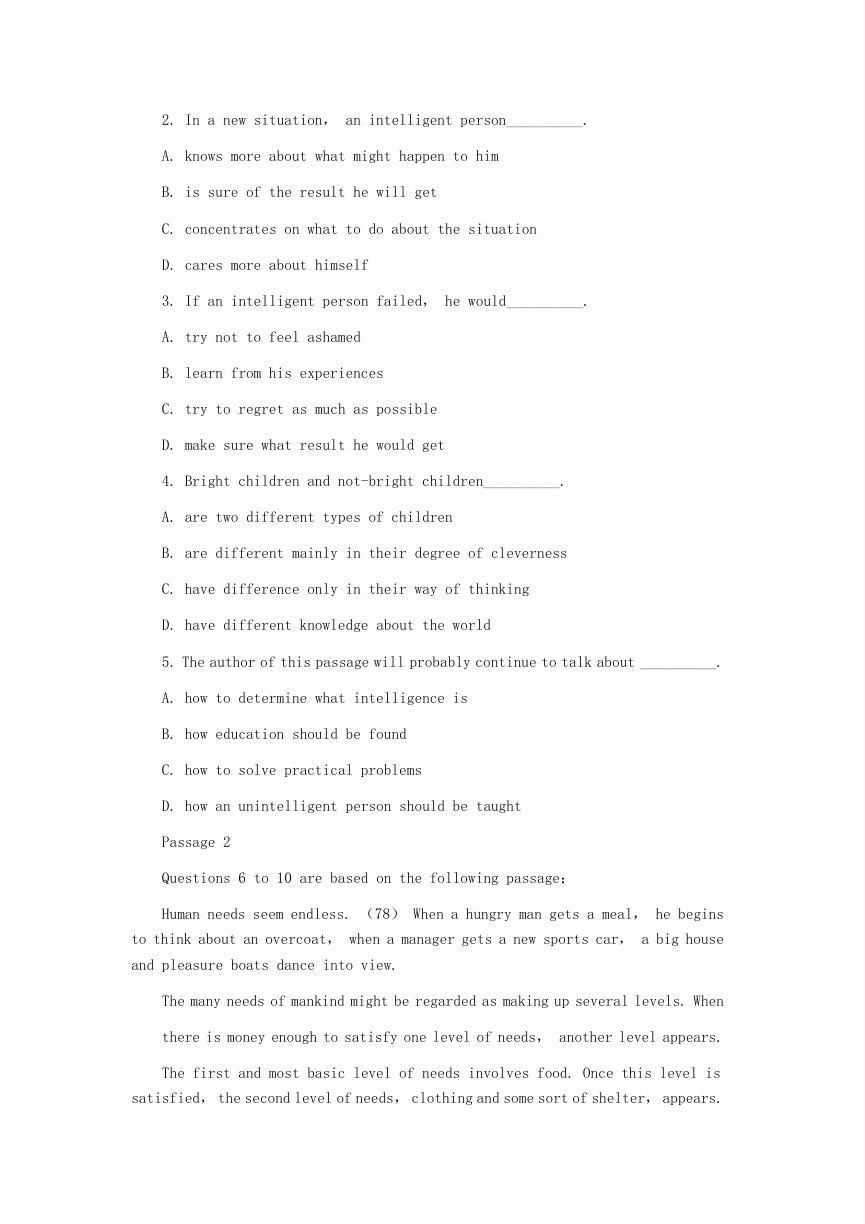
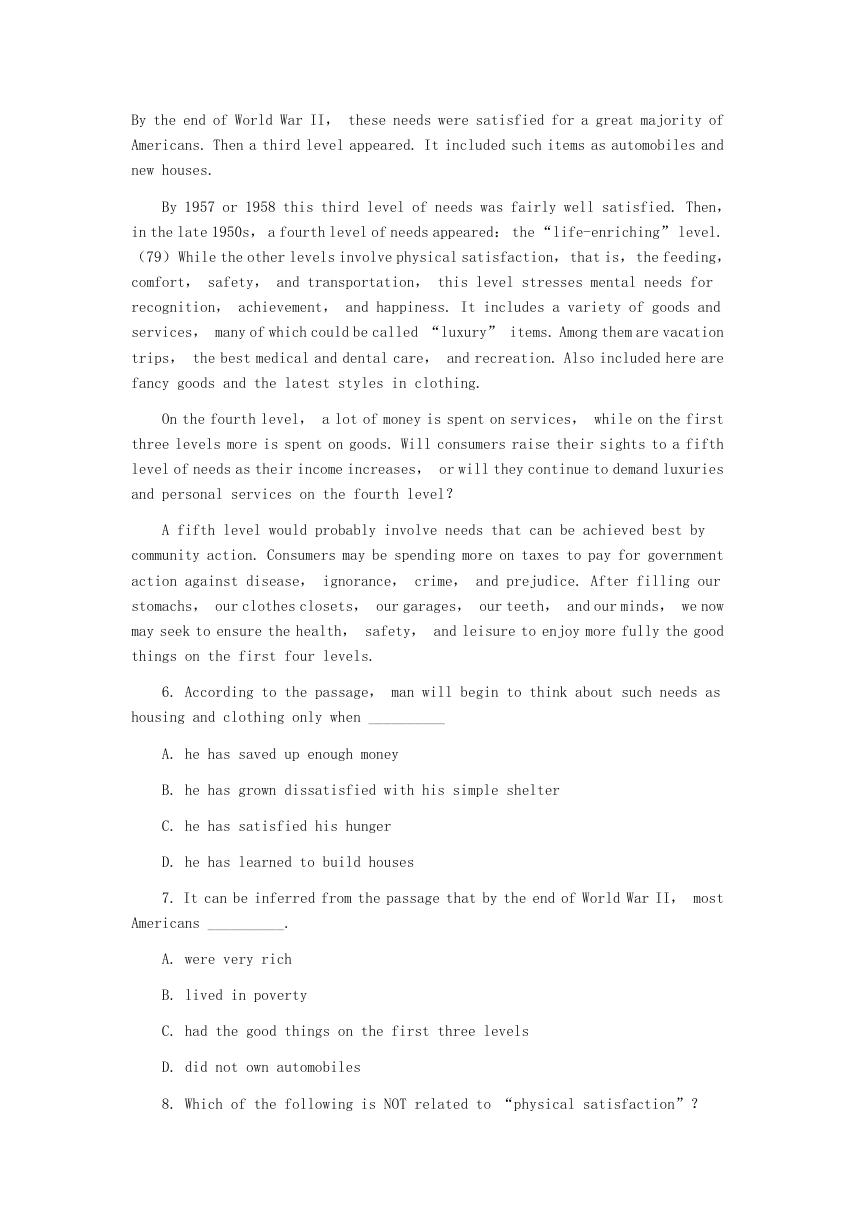
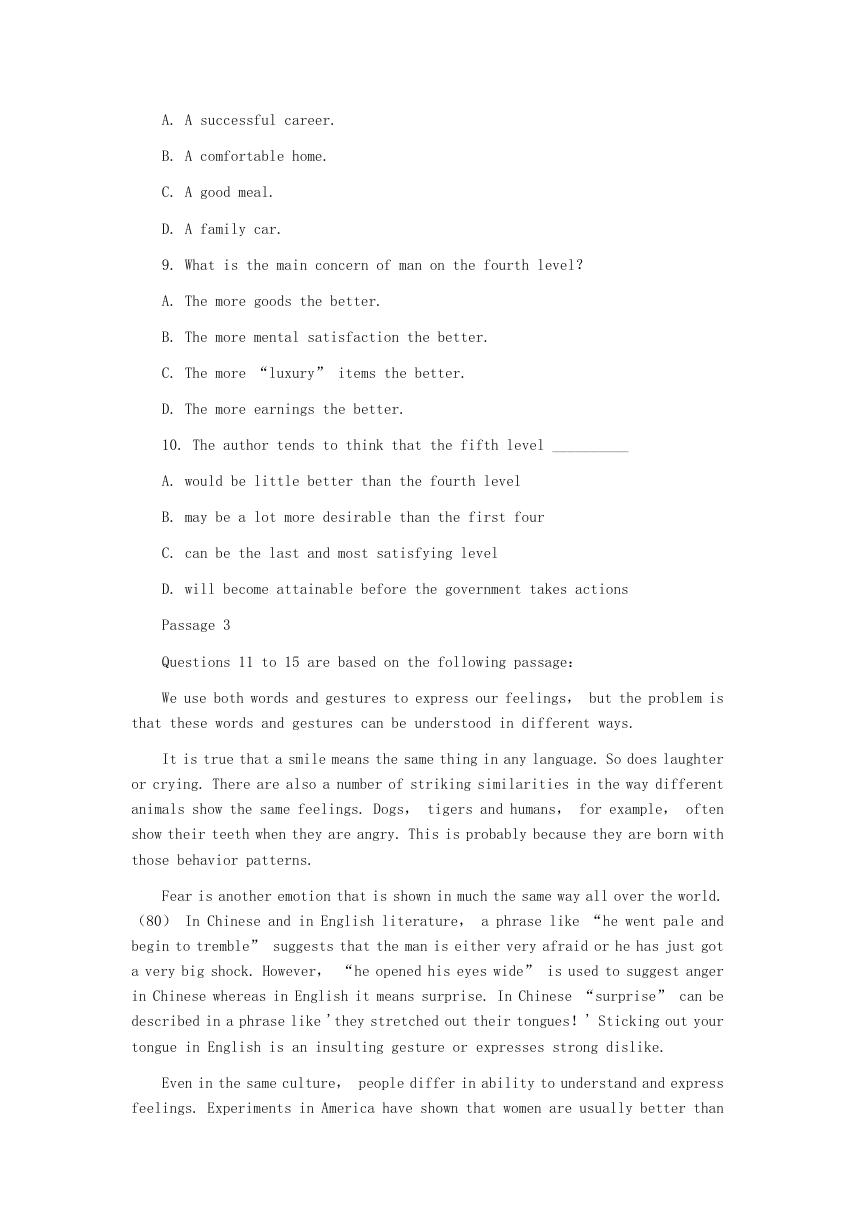
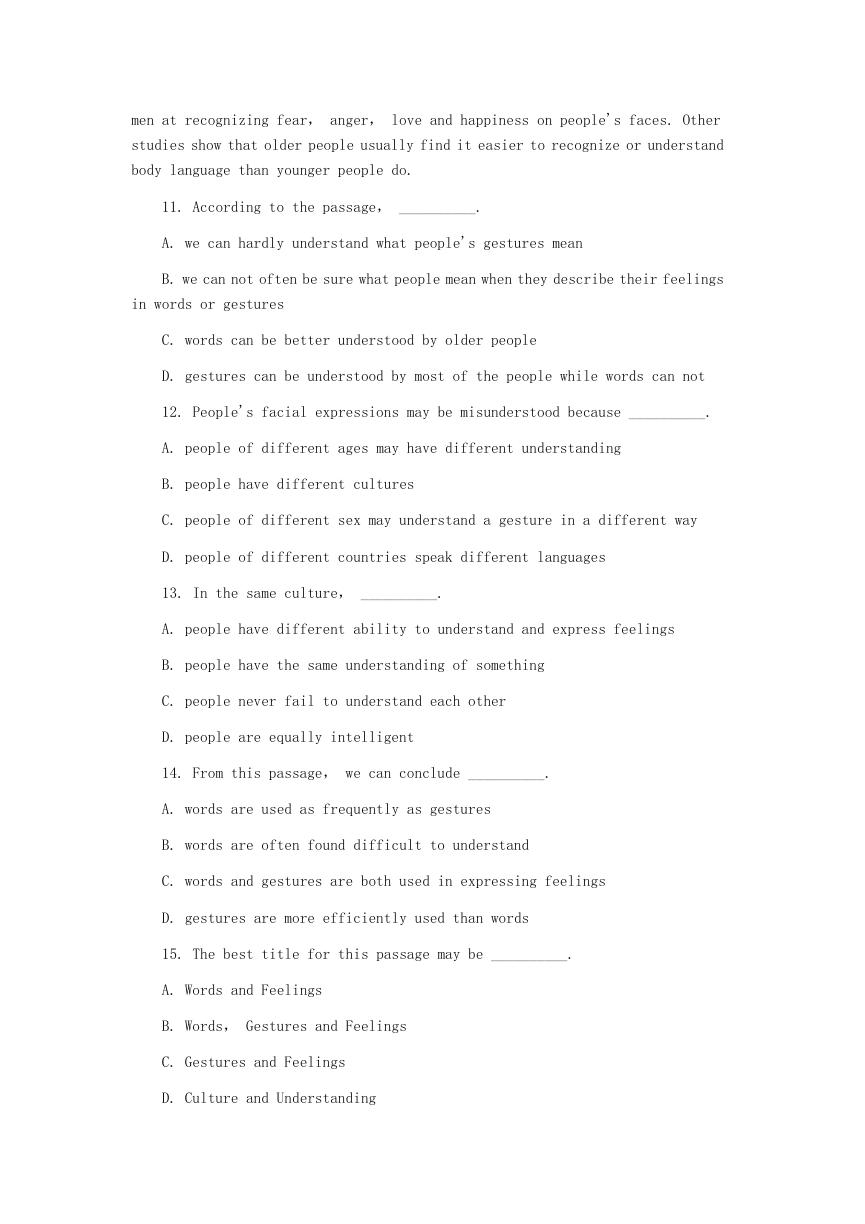
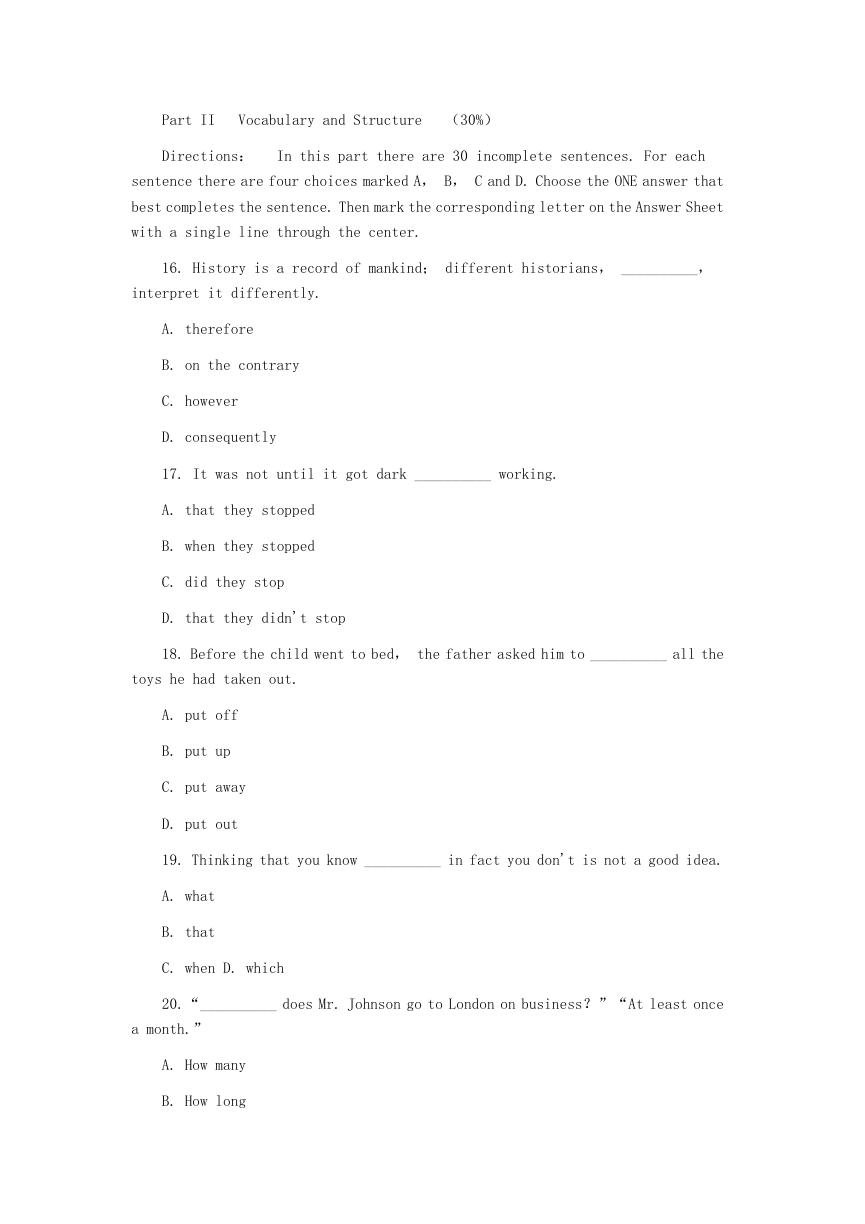
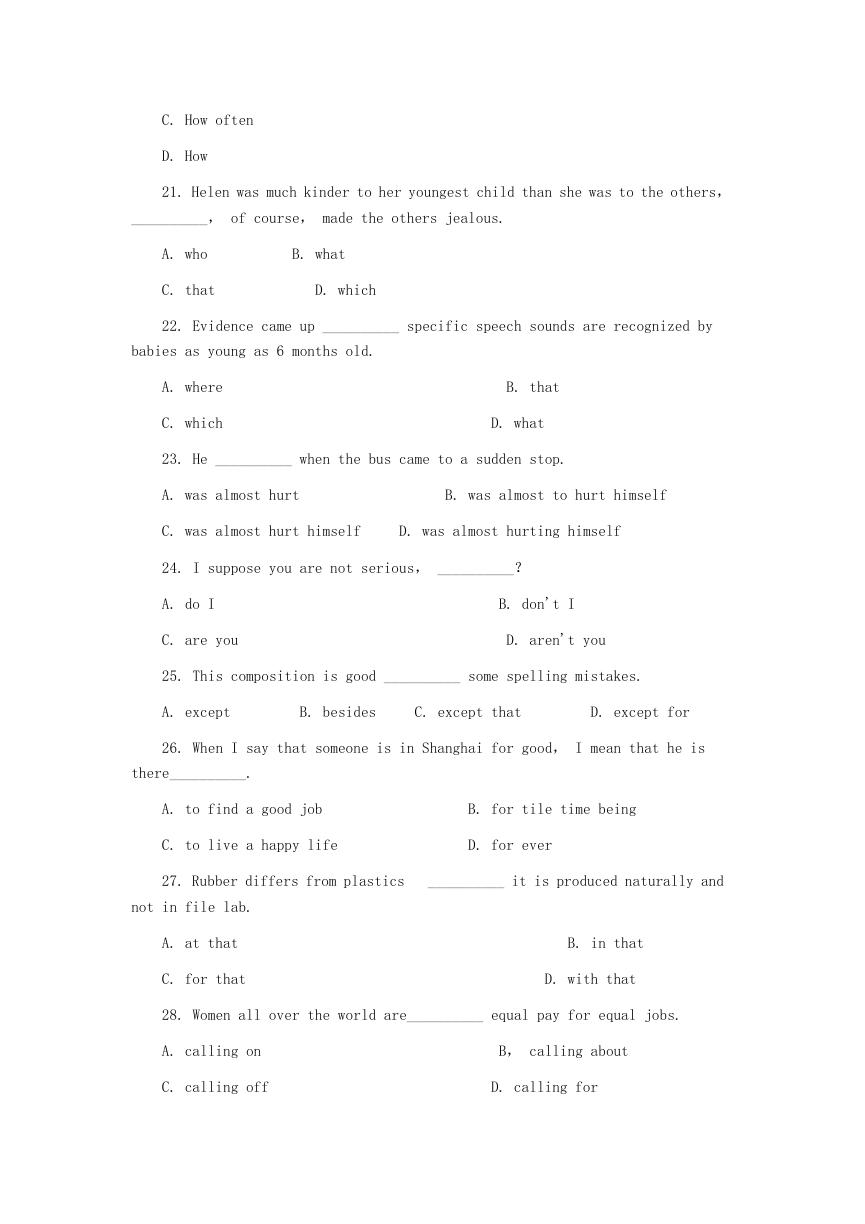
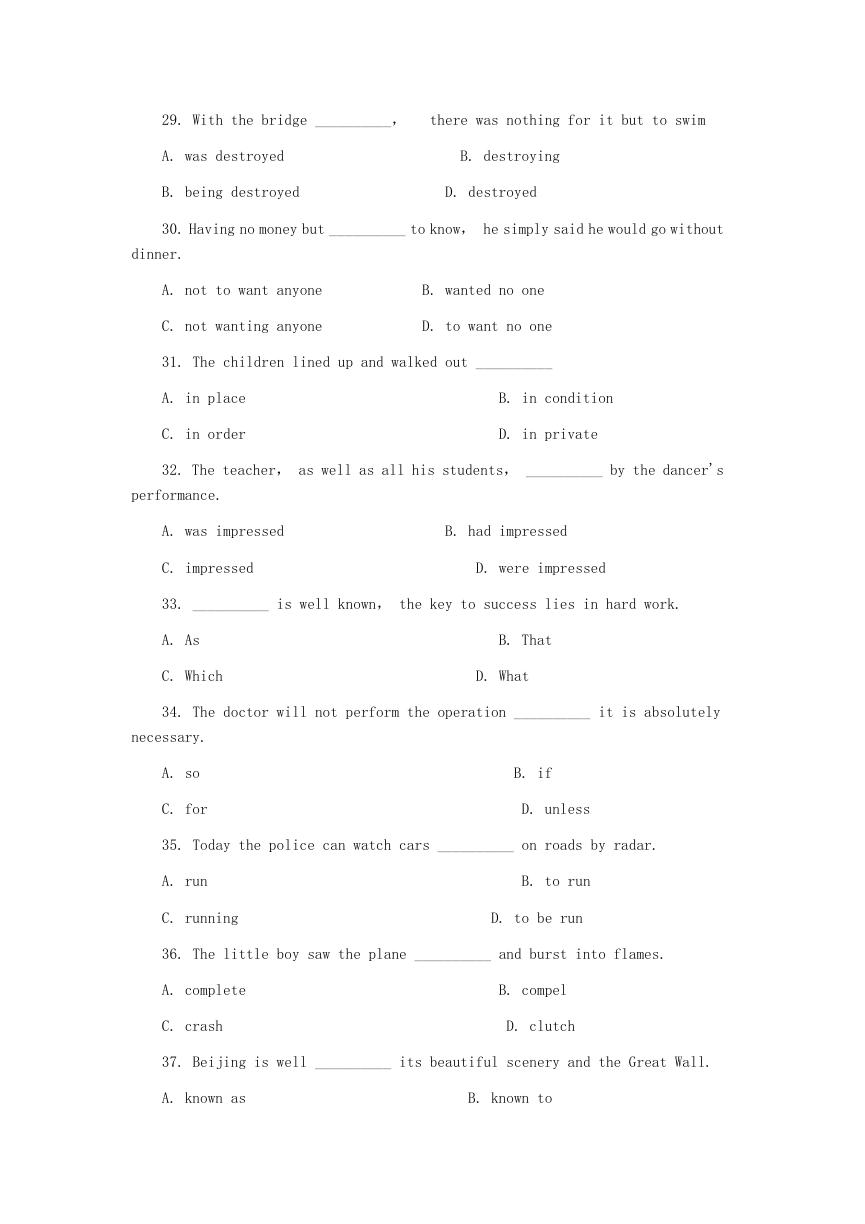








 2023年江西萍乡中考道德与法治真题及答案.doc
2023年江西萍乡中考道德与法治真题及答案.doc 2012年重庆南川中考生物真题及答案.doc
2012年重庆南川中考生物真题及答案.doc 2013年江西师范大学地理学综合及文艺理论基础考研真题.doc
2013年江西师范大学地理学综合及文艺理论基础考研真题.doc 2020年四川甘孜小升初语文真题及答案I卷.doc
2020年四川甘孜小升初语文真题及答案I卷.doc 2020年注册岩土工程师专业基础考试真题及答案.doc
2020年注册岩土工程师专业基础考试真题及答案.doc 2023-2024学年福建省厦门市九年级上学期数学月考试题及答案.doc
2023-2024学年福建省厦门市九年级上学期数学月考试题及答案.doc 2021-2022学年辽宁省沈阳市大东区九年级上学期语文期末试题及答案.doc
2021-2022学年辽宁省沈阳市大东区九年级上学期语文期末试题及答案.doc 2022-2023学年北京东城区初三第一学期物理期末试卷及答案.doc
2022-2023学年北京东城区初三第一学期物理期末试卷及答案.doc 2018上半年江西教师资格初中地理学科知识与教学能力真题及答案.doc
2018上半年江西教师资格初中地理学科知识与教学能力真题及答案.doc 2012年河北国家公务员申论考试真题及答案-省级.doc
2012年河北国家公务员申论考试真题及答案-省级.doc 2020-2021学年江苏省扬州市江都区邵樊片九年级上学期数学第一次质量检测试题及答案.doc
2020-2021学年江苏省扬州市江都区邵樊片九年级上学期数学第一次质量检测试题及答案.doc 2022下半年黑龙江教师资格证中学综合素质真题及答案.doc
2022下半年黑龙江教师资格证中学综合素质真题及答案.doc